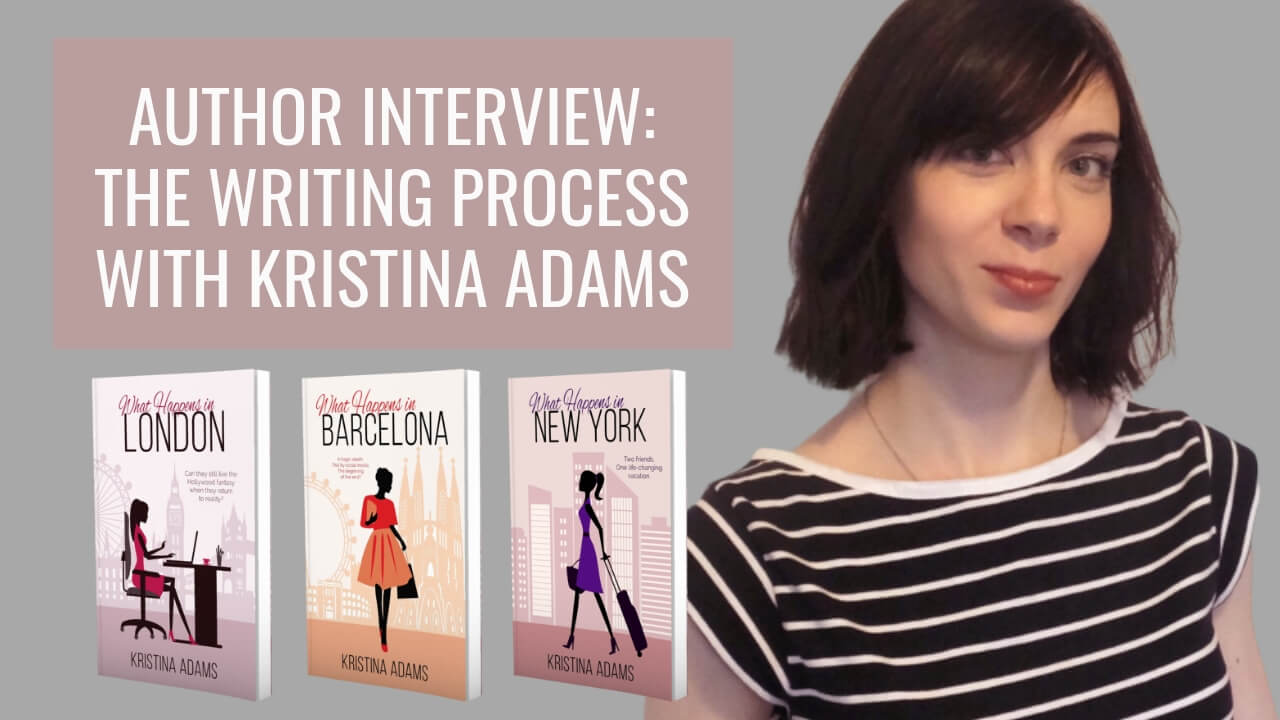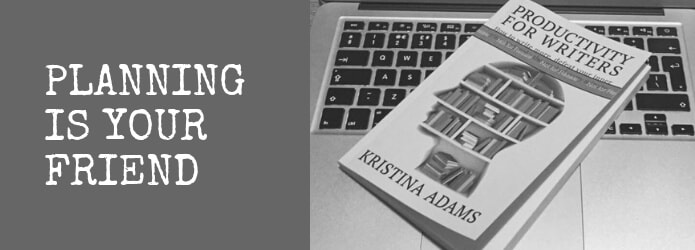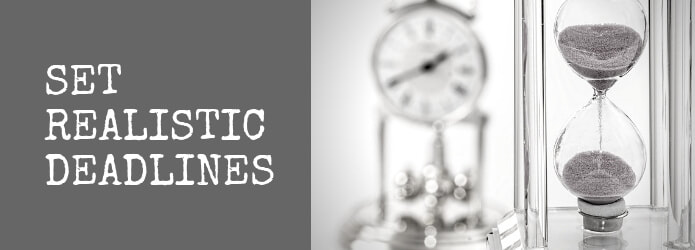|
Every writer has a process. What works for you might not work for someone else, and your approach might change over time. Here are 6 tips from indie author Kristina Adams that show how changing your writing process to suit mindset and circumstances can help you grow as a writer.
When I set out to publish my first book, I had no idea what I was doing. I made the whole thing up as I went along, absorbing as much advice as I could in the short space of time I had.
I’d set myself a tight deadline – to write, edit, and publish a book in a year – which, when you have no idea what you’re doing and you’re a one-woman band working a full-time job, is pretty insane. Fast-forward to now, and I’ve published four books and have a somewhat better idea of what I’m doing. I’m no expert, but I have come to accept that my writing process changes as I mature as a writer, as I grow as a person, and as my circumstances in life change. So let’s take a look at what's changed, and what you can learn from my ever-changing writing process ...
1. Planning is your friend
I never used to plan my writing. My dissertation tutor tried to convince me of the importance of planning, but I wouldn’t listen to him. (Pro tip: always listen to people more experienced than you, especially when you’re paying them.) When I started writing a book with multiple points of view and several spin-offs involved, his advice finally sunk in. Now, I don’t write anything without at least the hint of a plan first. Sometimes that plan is simply what the ending will be. Other times it’s so elaborate that there’s no room for missteps. It’s important to plan properly, though. A few years ago, I took part in NaNoWriMo. I was so excited that I’d planned my novel weeks in advance. When I went to write it in the October, I discovered – to my horror – that I hadn’t planned it very well at all. The Big Reveal scene was described as ‘Poppy finds out who the murderer is’. That was it. I’d spent all that time planning but hadn’t actually worked out the most important detail in a crime novel. Insert face palm here. The draft ended up being all over the place. I forced myself to hit the NaNoWriMo word count, but hated the piece so much that I almost quit writing fiction all together. (Another lesson learnt: don’t force yourself to finish a piece that you really, really don’t like any more. Not unless there’s someone else’s money on the line.) You don’t need to know every step along the way when you plan. I like to see it as akin to planning a journey: you know the destination and what stops you’ll make along the way, but you don’t know the other cars, the scenery, or the people you’ll come across. Planning is your friend, folks. It doesn’t dampen the creativity; it just stops you from digging yourself into a massive hole.
2. Listen to your body
This may seem like an odd thing to say in a post about writing, but as someone with six chronic health issues, I really do need to listen to my body. Too much stress exacerbates my fibromyalgia, which then means I’m too tired and in too much pain to function. It’s therefore imperative that when I start to feel weak, the pain gets too much, or the room starts spinning, I go to bed and close my eyes. Sometimes that rest is a couple of hours; other times it’s days. Either way, if I didn’t rest, I’d end up in a much worse state and wouldn’t be able to write or publish at all. So many people come to me and say, ‘I feel tired all the time’. If you fall into this category, I have three pieces of advice:
3. Abandon your book (just for a while)
It’s amazing how many things you can spot when you’ve taken a break from working on something. The longer you leave something in the drawer for, the more you’ll spot and the easier it is to work through any issues that you may or may not know about. I didn’t have much time to do this when working on What Happens in New York, but with more recent books I’ve written a first draft, then gone on to write another first draft of something else before going back to it. This means I’m working on first drafts while in a writing mindset; then I can switch to an editor’s mindset. Switching rapidly between writing and editing can be difficult, which is why I like to do them in bulk for longer projects. It strengthens my skills in both as I’m in that mindset for longer. It also means I’m less likely to overthink things during the crucial (but ugly) first-draft stage.
4. Ask for help
My local writing community has been pivotal to my growth as a writer. Whenever I get stuck on a particular issue, there’s always someone who can help. I have one friend in particular who’s brilliant at fixing plot holes, and so when I was unsure of something in my most recent book, she was the first person I went to. She helped me to figure everything out, and suddenly the book wasn’t so intimidating any more. I can’t emphasize enough the importance of a support network. Even if your support network doesn’t consist of other writers or editors (although it helps), having people in your corner that you go to for help when you need it makes a huge difference to your growth and your confidence as a writer. If you don’t have access to a physical writing community, there are plenty available online. Facebook, Twitter, and even Second Life have writing communities, and there are a plethora of websites that are dedicated to writing, too.
5. Be realistic with deadlines
When I set myself a 12-month deadline to publish What Happens in New York, I had no idea how much work was involved in self-publishing (unless one has a budget that far exceeds my monthly salary). Had I known, I would’ve set myself a different deadline. I ended up rushing a lot of processes early on and making rookie mistakes that make me cringe when I look back on them. Nowadays, I don’t put anything up for pre-order until the book is in a state that I’m happy with and only requires one last read-through to check for any niggling issues that might have been missed. Having a public deadline definitely helped to motivate me. Had I not had it, I may well have kept procrastinating, coming up with an abundance of excuses why I shouldn’t hit the ‘Submit for pre-order’ button. These days I don’t make my deadlines quite so public – I tell a few close friends that I know will hold me accountable instead. These are both fans of my writing and fans of me, which encourages me to keep going while also offering moral support when things go wrong.
6. Accept that you know nothing
The less you know, the more room you have to grow. The more room you have to grow, the more you can succeed. Everyone knows something that you don’t know, which is why it’s important to take advice from as many sources as you can. If someone has said something mean, acknowledge it, then ignore it. But if someone offers constructive criticism, take some time to think about their comments. It may be hurtful, but often the greatest pain comes from the greatest truths. No one likes their writing to be criticized, but it’s the only way you’ll improve as a writer. If those comments come from your target audience, it’s especially important to listen since they’re the ones that will download your book. If they don’t like something, they’re the ones you really need to pay attention to before you do something that could dampen your sales. As time goes on, you’ll learn the difference between constructive feedback and someone who's just got an axe to grind and you just happened to be their unfortunate target. In the end ... Everyone’s writing process is different. That’s part of what I find most fascinating about writing. I love hearing how different people write in different ways. I have some friends who plan their books in so much depth that they only need one or two edits. I have others who love editing but can’t stand first-draft stage. What really matters is that you find a writing process that works for you. Your writing process will change as you grow, and as your circumstances in life change. That’s natural. When you accept that, it becomes a lot easier to get your writing done. It also means you’re kinder to yourself, which means that you’re more relaxed. When you’re more relaxed, you can write better because you’re not putting too much pressure on yourself. Then, when you write better, you achieve more. And in the end, isn’t that what we all want?
Kristina Adams is an author, blogger, and reformed caffeine addict. She’s written four novels poking fun at celebrity culture, one nonfiction book on productivity for writers, and too many blog posts to count. She shares advice for writers over on her blog, The Writer’s Cookbook.
3 Comments
Louise Harnby
8/4/2019 10:20:22 pm
Glad you enjoyed it, Dola. I think Kristina's advice is superb and covers all the bases!
Reply
Seigha
7/7/2020 06:46:33 am
Thanks for these wonderful tips. I particularly liked the one about planning being similar to going on a journey, knowing the destination but obviously not knowing everything else you would encounter on the way!
Reply
Leave a Reply. |
BLOG ALERTSIf you'd like me to email you when a new blog post is available, sign up for blog alerts!
TESTIMONIALSDare Rogers'Louise uses her expertise to hone a story until it's razor sharp, while still allowing the author’s voice to remain dominant.'Jeff Carson'I wholeheartedly recommend her services ... Just don’t hire her when I need her.'J B Turner'Sincere thanks for a beautiful and elegant piece of work. First class.'Ayshe Gemedzhy'What makes her stand out and shine is her ability to immerse herself in your story.'Salt Publishing'A million thanks – your mark-up is perfect, as always.'CATEGORIES
All
ARCHIVES
July 2024
|
|
|
|






















 RSS Feed
RSS Feed





